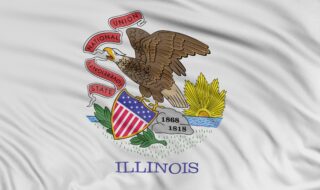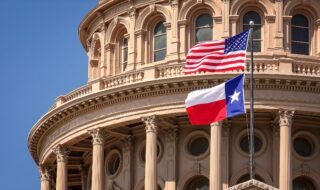NEW NFIB SURVEY: Small Business Optimism Declines in April
NEW NFIB SURVEY: Small Business Optimism Declines in April
May 13, 2025
Fewer owners planning to increase business investments
WASHINGTON, D.C. (May 13, 2025) – The NFIB Small Business Optimism Index declined by 1.6 points in April to 95.8, the second consecutive month below the 51-year average of 98. The Uncertainty Index decreased four points from March to 92 but remained far above the historical average of 68. Seasonally adjusted, 34% of business owners reported job openings they could not fill in April, down six points from March. The last time job openings were below this level was in January 2021.
“Uncertainty continues to be a major impediment for small business owners in operating their business in April, affecting everything from hiring plans to investment decisions,” said NFIB Chief Economist Bill Dunkelberg. “While owners are still trying to fill a high number of current job openings, their outlook on business conditions is less supportive of future business investments.”
Key findings include:
- The net percent of owners expecting better business conditions fell six points from March to a net 15% (seasonally adjusted), the lowest since last October. This component, along with unfilled job openings, contributed most to the Optimism Index’s decline.
- The net percent of owners expecting higher real sales volumes fell four points from March to a net negative 1% (seasonally adjusted). This is the fourth consecutive month real sales expectations declined.
- A net negative 4% (seasonally adjusted) of owners plan inventory investment in the coming months, down three points from March and the lowest reading in 11 months.
- Eighteen percent (seasonally adjusted) plan capital outlays in the next six months, down three points from March. The last time the percent of firms planning capital outlays was this low was in April 2020, during the COVID-19 pandemic.
- The percent of small business owners reporting labor quality as the single most important problem for business was unchanged from March at 19%, remaining the top issue for the third consecutive month.
- Fourteen percent of owners reported that inflation was their single most important problem in operating their business, down two points from March and the lowest reading since September 2021. Inflation is now ranked in third place as the single most important problem.
- In April, 10% of small business owners reported the cost or availability of insurance as their single most important problem, up two points from March and the highest since March 2020.
- When asked to rate the overall health of their business, 13% reported excellent (up two points), and 56% reported good (up three points). Twenty-seven percent reported the health of their business was fair (down four points) and 4% reported poor (unchanged).
As reported in NFIB’s monthly jobs report, a seasonally adjusted 34% of all small business owners reported job openings they could not fill in April, down six points from March. Of the 56% of owners hiring or trying to hire in April, 85% reported few or no qualified applicants for the positions they were trying to fill. A seasonally adjusted net 13% of owners plan to create new jobs in the next three months, up one point from March.
Labor costs reported as the single most important problem for business owners fell three points in April to 8%.
Seasonally adjusted, a net 33% reported raising compensation, down five points from March. A seasonally adjusted net 17% plan to raise compensation in the next three months, down two points from March.
Fifty-eight percent of owners reported capital outlays in the last six months, down one point from March and the first decline since September of last year. Of those making expenditures, 40% reported spending on new equipment, 25% acquired vehicles, and 16% improved or expanded facilities. Fourteen percent spent money on new fixtures and furniture and 6% acquired new buildings or land for expansion.
In April, the percent of small business owners reporting poor sales as their top business problem remained at 9% for the fourth consecutive month. A net negative 8% of all owners (seasonally adjusted) reported higher nominal sales in the past three months, up three points from March and the highest reading since September 2023.
The net percent of owners reporting inventory gains fell two points from March to a net negative 5%, seasonally adjusted. Not seasonally adjusted, 13% reported increases in stocks and 17% reported reductions. A net negative 6% (seasonally adjusted) of owners viewed current inventory stocks as “too low” in April, up one point from March.
Seasonally adjusted, a net 28% plan price hikes in April, down two points from March. The net percent of owners raising average selling prices fell one point from March to a net 25%, seasonally adjusted. Unadjusted, 11% of owners reported lower average selling prices and 39% reported higher average prices.
The frequency of reports of positive profit trends was a net negative 21% (seasonally adjusted), seven points better than in March and the highest reading since March 2023. Among owners reporting lower profits, 38% blamed weaker sales, 14% cited usual seasonal change, 11% blamed the rise in the cost of materials, 9% cited the price change of their product or service, and 8% cited labor costs. For owners reporting higher profits, 51% credited sales volumes, 17% cited usual seasonal change, and 10% cited higher selling prices.
Three percent of owners reported that financing and interest rates were their top business problem in April, unchanged for the fourth consecutive month. Twenty-six percent of all owners reported borrowing on a regular basis, down two points from March. A net 5% reported their last loan was harder to get than in previous attempts, down one point from March. A net 6% reported paying a higher rate on their most recent loan.
Nine percent (seasonally adjusted) of owners reported that it is a good time to expand their business, unchanged from March and a historically low reading.
Taxes were ranked just below labor quality as the top issue, with 16% of owners reporting it as their the single most important problem, down two points from March’s highest reading since November 2021. The percent of small business owners reporting government regulations and red tape as their single most important problem rose one point from March to 9%. Seven percent reported competition from large businesses as their single most important problem, up one point from March.
The NFIB Research Center has collected Small Business Economic Trends data with quarterly surveys since the fourth quarter of 1973 and monthly surveys since 1986. Survey respondents are randomly drawn from NFIB’s membership. The report is released on the second Tuesday of each month. This survey was conducted in April 2025.
NFIB is a member-driven organization advocating on behalf of small and independent businesses nationwide.
Related Articles














